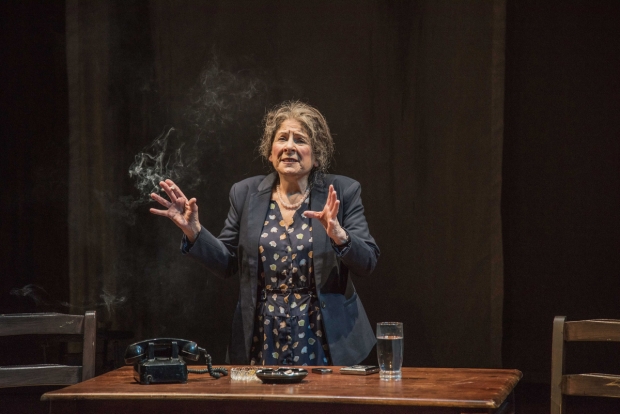Golda's Balcony

(© Andrew Brilliant)
After the results of our recent election, it feels all the more poignant to recall the legacy left by Golda Meir, one of the most important leaders of the 20th century, and one of the few women who headed a nation.
William Gibson's solo play, Golda's Balcony, at the New Repertory Theatre is centered on the events of the Yom Kippur War but begins with Meir at the end of her life. Old and sick, she looks back at her achievements and her failures. Meir was only 8 years old when she emigrated with her family from Russia to Milwaukee where she attended school and became infused with the Zionist mission. After her marriage to Morris Myerson, the couple moved to Israel in 1921. She entered politics and changed her name from Goldie Myerson (or Meyerson, depending on the source) to Golda Meir as she rose through the party ranks to Prime Minister from 1969 to 1974.
Cast as Golda, Bobbie Steinbach wanders the New Rep mainstage among a series of tall hanging screens designed by JiYoung Han that reflect Seaghan McKay's projections, including a huge map of Israel. The setting, reminiscent of Gordon Craig's famous early 20th-century scenery for Hamlet, reduces the size of the actor to suggest that one human being can be buffeted within the forces of the universe. If not for John Malinowski's lighting design that keeps Meir firmly in view, she might be lost in the space. Beneath the platforms centering the stage are heaps of shoes, with a pile of suitcases at one side, a reminder of the victims of the Holocaust.
However, Steinbach is nothing if not in control of the character and her surroundings. A small-size woman wrapped in a period dress and smoking countless cigarettes, she inhabits the square figure of Meir with authority, intelligence, and passion during the 100-minute monologue. She shifts from private to public concerns, and reaches from her childhood to the pressures of that month in October, during the Yom Kippur War of 1973, when Israel was threatened with annihilation. She also reacts to her triumphs — a meeting with the Pope, a victorious journey to America where she raises $50 million to buy ammunitions for the newly declared State of Israel in 1948 — and her failures especially the shocking unpreparedness of Israel's military on her watch.
However, under the cautious direction of Judy Braha, the sense of the character's magnificence is diminished in favor of emphasizing Meir's self-deprecating description of herself as a housewife who ruined her husband's life. Although it's true that the world leaders of the past were also ordinary men and women, they overcame the obstacles in their paths to change the course of history. Meir was one of the founders of Israel, a miracle in the aftermath of the horrors of World War II and the enmity of the neighboring nations. Consumed by her devotion to the cause of the new state, she became a catalyst for its survival. Confirming Meir's firm position in the pantheon of heroes should be the most important reason for reviving Gibson's play, along with serving as an ironic commentary on the status of the country today.











